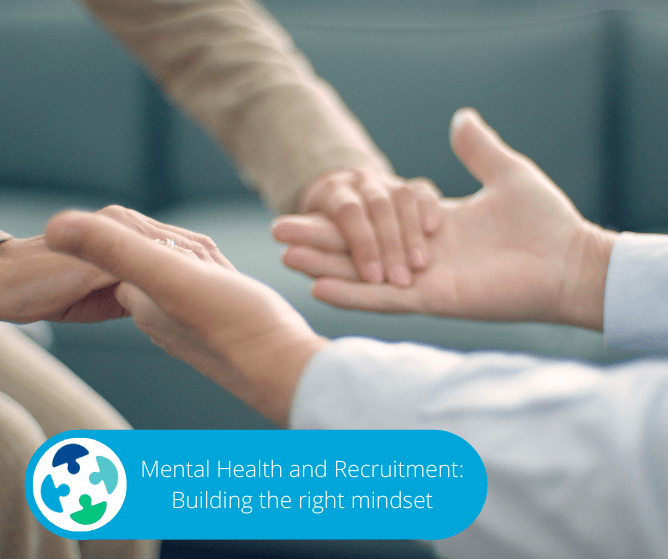Like anything, recruitment works best when employers are operating within a positive mindset.
And a big part of cultivating that mindset is maintaining good mental health.
However, in a labour-short market that is attempting to recover from a pandemic, this can often be easier said than done.
There is a lot of pressure to overcome.
So, we’ve assembled our best strategies for maintaining good mental health and cultivating the right recruitment mindset.
Mental Health And Recruitment: Building A Good Mindset
It’s A Tough Job
Recruiting quality team members is a tough task right now. There is a distinct labour shortage in the market, there are fewer international candidates due to travel restrictions, and we are supposedly in the midst of The Great Resignation.
On top of all that, there is a general feeling of unrest as people reevaluate their priorities when it comes to their employment.
In these circumstances, recruiting can feel very taxing and like an uphill battle. It is easy to fall into a negative headspace. But, that is the last thing you want to have happen. If you are operating from a place of negativity, then it will make the recruitment process even more difficult.
Instead, you want to ensure you maintain good mental health and a positive mindset. Let’s explore how you can do that.
Focus On Mental Health
Good mental wellbeing is an asset to your business. When we are in a good headspace, it is easier to cope with the daily stress of their job and life outside of work. It also fosters greater productivity and creativity, giving your business the edge over others in your industry.
But, in the pressure cooker that is the workplace, good mental health can be at risk. Which is why it is vital to cultivate a culture that prioritises good mental health. This is not just for your management, but for your team as a whole. When everyone is operating from a good space, it generates good business.
Here are some ways to do that:
Acknowledge all states of mental health & get the communication flowing
Mental health should not be considered a “taboo topic”. Rather, it is something you should speak about openly with management and your team. Nearly half of all New Zealanders will meet the criteria for diagnosis of a mental illness at some stage during their lives.
So, help people to recognise the signs that they might not be ok, and have a strategy to help them take steps towards improving their mental health. Ensure there are always open lines of communication and attentive and responsive management.
Have a mental health policy
By dedicating a policy towards good mental health, your employees will recognise that it is a priority in your workplace and something you prioritise in their overall wellbeing. This will help to remove any stigmas. Ensure your policy includes resources that your team can access if they need and detailed info on how to access them.
Check in with your team
You are probably already checking in with your team regularly regarding their performance. So, at the same time, why not do a mental health check in to see if they require any support? Uncharacteristic behaviour can be a sign that someone is struggling, so make doubly sure to check in with any team members that are behaving differently.
Check in with yourself
While looking after your team is a priority, so is looking after yourself. You cannot pour from an empty cup. Be aware of your own mental state and how you can maintain the right mindset. Take the same channels you would recommend your employees take if you find yourself struggling.
Diet and exercise
These two aspects are super important for fostering good mental health. While the ball is largely in your team’s court here, there are plenty of things you can do to encourage good diet and exercise habits.
Add value to your staff by having a dietitian come in and speak about health and wellbeing. Consider supplying fruit boxes or hot breakfasts that will support staff in healthier eating choices. And, discounted gym memberships could also be another option to get the endorphins going.
Prioritise downtime
Burnout is a very real possibility in the modern workforce, especially when there are hybrid working arrangements and little opportunity to rest. But, it is essential that you and your people take designated downtime to prevent burnout from happening.
Of course, this includes taking breaks throughout the day and annual leave. But, it is also about ensuring your work/life balance is not knocked off by spending too much time working from home. Have set work hours and ensure you close the door (figuratively or literally) on your work tasks at the end of the day.
Have an EAP Program for your staff
Employee Assistance Programs or EAPs are programs that are designed to help employees with personal issues that might impact their job performance. Voluntary and confidential, EAPs can help individual team members address a huge range of health, financial and social issues.
Having one that your staff can access is essential. By providing this outlet, it helps to emphasise the priority your organisation puts on good wellbeing. And as we already know, supported staff are more productive workers!
Get Expert Help
Are you feeling the strain of the recruitment shortage?
Don’t forget you can always lighten your load by outsourcing this job to the professionals!
Invest in your own mental health and let LD Recruit take care of your staffing. Get in touch with us today.












